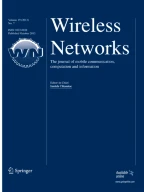Abstract
We propose a novel trust and probabilistic node selection mechanism for content distribution in mobile ad hoc networks. Due to the open nature of such networks which as a rule do not have strict node membership control, the selection of trustworthy nodes is an important challenge, especially as the resources (e.g., battery, bandwidth) of the mobile devices are limited and should not be wasted on erroneous or malicious content. Our proposal, in addition to considering the trustworthiness of nodes, ensures that the traffic load is equally shared amongst the population of nodes, thus further conserving mobile node resources. We analyse the proposed mechanisms and evaluate it against selected previously proposed trust schemes which, in the majority, favour the selection of the most trustworthy node. We demonstrate the benefits of our proposal which provides load balancing and prevents overuse of a single node’s resources, while still providing a good performance in regards to accurately choosing trustworthy nodes to provide the required content.
Similar content being viewed by others
Notes
For good nodes the probability for a good outcome equals to the probability of adhering to the core integrity behaviour P(A), for bad nodes it is 1 − P(A).
References
Teacy, W. T. L., Patel, J., Jennings, N. R., & Luck, M. (2006). TRAVOS: Trust and reputation in the context of inaccurate information sources. Autonomous Agents and Multi-Agent Systems, 12, 183–198.
Ries, S., & Heinemann, A. (2008). Analyzing the robustness of certain trust. In Y. Karabulut, J. Mitchell, P. Herrmann & C. Jensen (Eds.), Trust management II, IFIP advances in information and communication technology (pp. 51–67). Boston: Springer.
Michiardi, P., & Molva, R. (2002). CORE: A collaborative reputation mechanism to enforce node cooperation in mobile ad hoc networks. In Proceedings of the IFIP TC6/TC11 sixth joint working conference on communications and multimedia security: Advanced communications and multimedia security, p. 121.
Buchegger, S. (2004). Coping with misbehaviour in mobile ad-hoc networks. http://infoscience.epfl.ch/record/521/files/sonjaThesis.pdf.
Shankaran, R., Varadharajan, V., Orgun, M. A., & Hitchens, M. (2009). Context-aware trust management for peer-to-peer mobile ad-hoc networks. Computer Software and Applications Conference, 2, 188–193.
Wi-Fi Direct, http://www.wi-fi.org/.
Djatmiko, M., Boreli, R., Seneviratne, A., & Ries, S. (2011). Trust-based content distribution for mobile ad hoc networks, modeling, analysis simulation of computer and telecommunication systems (MASCOTS). 2011 IEEE 19th international symposium on, pp. 433–436.
ns-2, http://www.isi.edu/nsnam/ns/.
Petander, H. (2009). Energy-aware network selection using traffic estimation. In Proceedings of the 1st ACM workshop on mobile internet through cellular networks, MICNET ’09, pp. 55–60.
Li, X., Zhou, F., & Yang, X. (2011). A multi-dimensional trust evaluation model for large-scale P2P computing. Journal of Parallel and Distributed Computing, 2, 188–193.
Quercia, D., & Hailes, S. (2007). MATE: Mobility and adaptation with trust and expected-utility. International Journal of Internet Technology and Secured Transactions (IJITST), 1, 43–53.
Kamvar, S. D., Schlosser, M. T., & Garcia-Molina, H. (2003). The Eigentrust algorithm for reputation management in P2P networks. In Proceedings of the 12th international conference on World Wide Web, pp. 640–651.
Le-Blond, S., Legout, A., & Dabbous, W. (2008). Pushing bittorrent locality to the limit. CoRR. http://arxiv.org/abs/1011.1892.
Lee, J. H., Han, B. J., Lim, H. J., Kim, Y. D., Saxena, N., & Chung, T. M. (2009). Optimizing access point allocation using genetic algorithmic approach for smart home environments. The Computer Journal, 52(8), 938–949.
Bai, F., Sadagopan, N., & Helmy, A. (2003). IMPORTANT: a framework to systematically analyze the impact of mobility on performance of routing protocols for adhoc networks. INFOCOM, 2, 825–835.
Lee, K., Hong, S., Kim, S. J., Rhee, I., & Chong, S. (2009). SLAW: A new mobility model for human walks. INFOCOM , 855–863.
Tournoux, P. -U., Leguay, J., Benbadis, F., Conan, V., de Amorim, M. D., & Whitbeck, J. (2009). The accordion phenomenon: Analysis, characterization, and impact on DTN routing. INFOCOM , pp. 1116–1124.
Whitbeck, J., de Amorim, M. D., & Conan, V. (2010). Plausible mobility: Inferring movement from contacts. In Proceedings of the second international workshop on mobile opportunistic networking (MobiOpp ’10), pp 110–117.
Johnson, D. B., & Maltz, D. A. (1996). Dynamic source routing in ad hoc wireless networks. Mobile Computing, 353, 153–181.
Acknowledgements
This research work has been supported by funding from National ICT Australia (NICTA). NICTA is a research organization funded by Australian Government research initiatives through Australian Research Council (ARC). The authors would like to thank Henrik Petander for providing his data-sets for the power consumption of Google Android phones.
Author information
Authors and Affiliations
Corresponding author
Rights and permissions
About this article
Cite this article
Djatmiko, M., Boreli, R., Seneviratne, A. et al. Resources-aware trusted node selection for content distribution in mobile ad hoc networks. Wireless Netw 19, 843–856 (2013). https://doi.org/10.1007/s11276-012-0505-5
Published:
Issue Date:
DOI: https://doi.org/10.1007/s11276-012-0505-5
